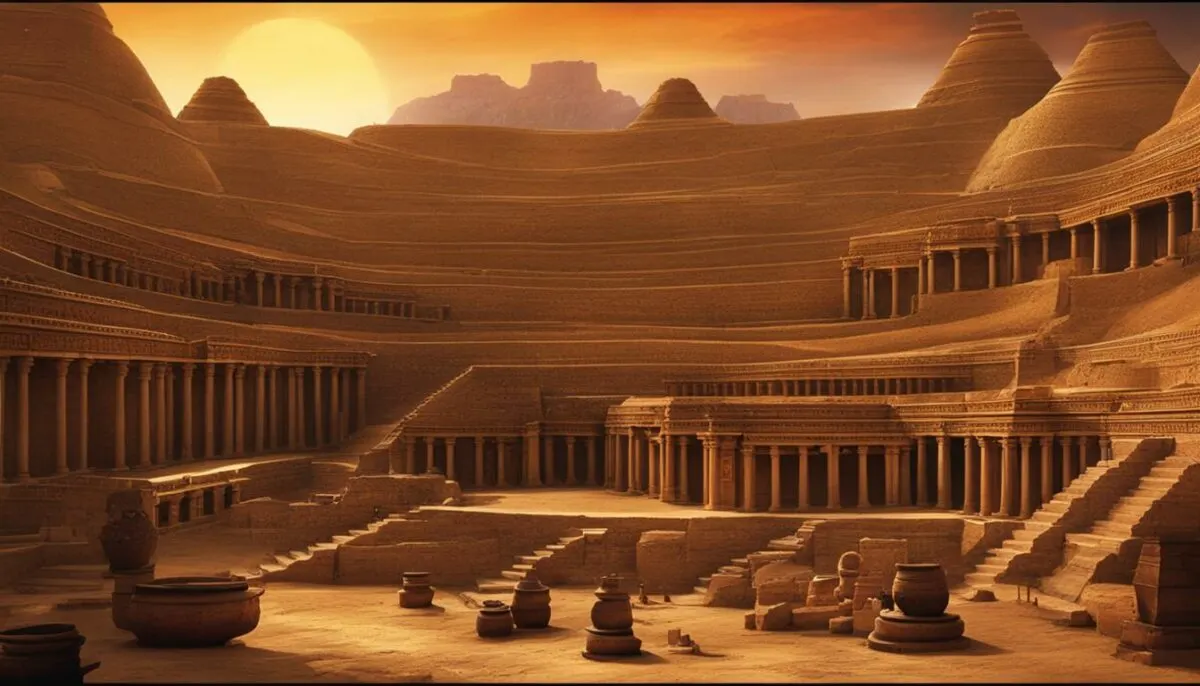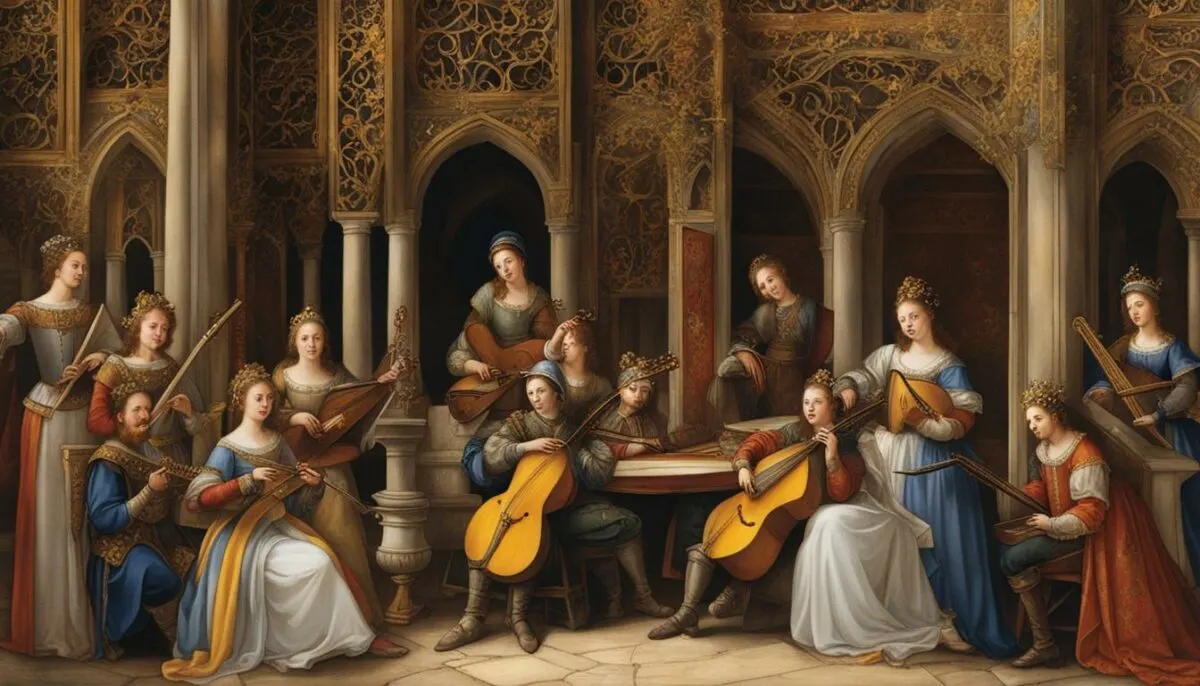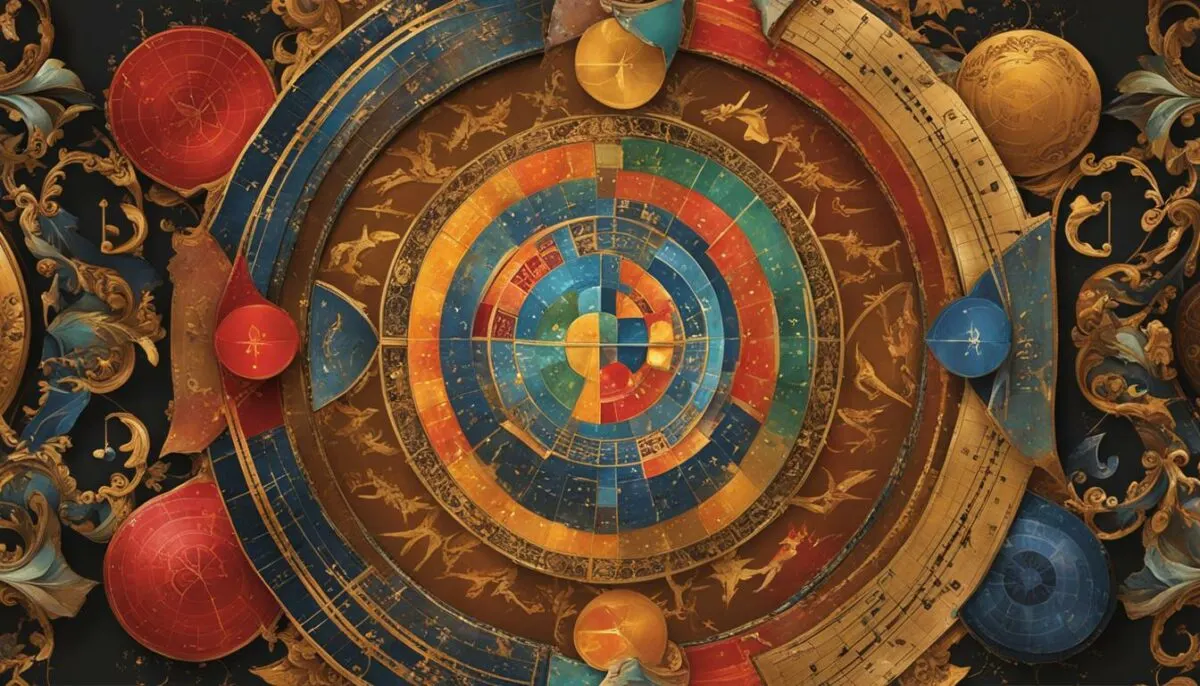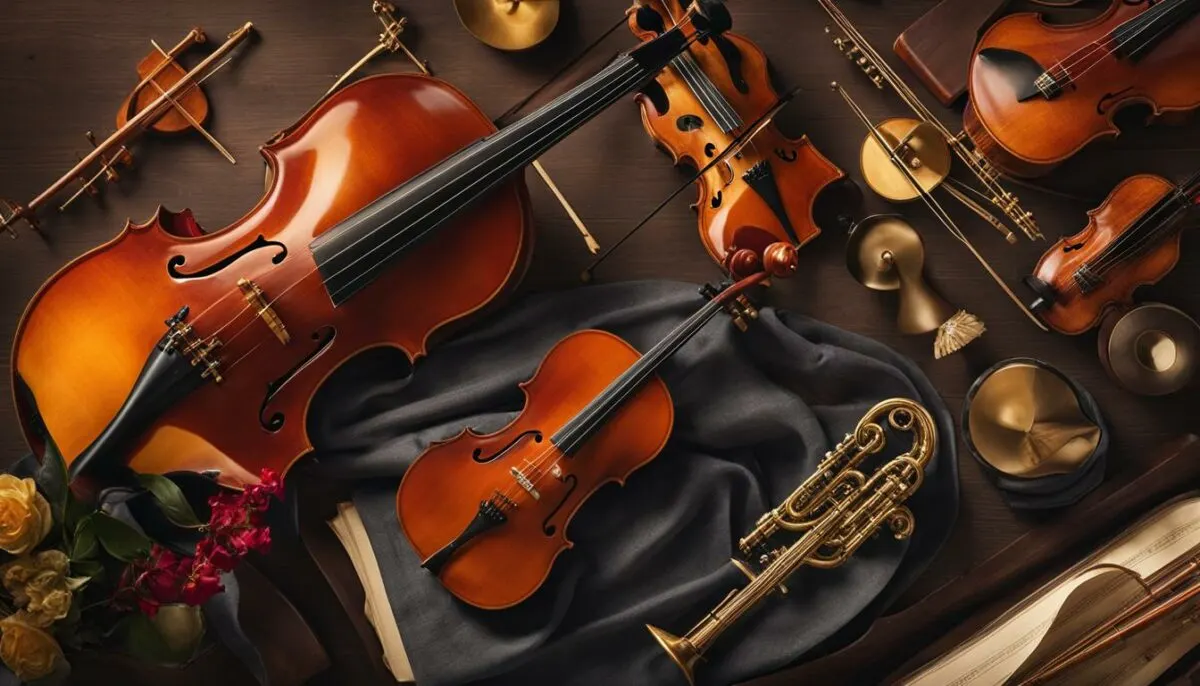Music has been an essential part of human culture since time immemorial. From the ancient beats of iconic drums to the soulful melodies of the violins, music is a universal language that transcends all boundaries. But amidst all the sweet melodies, one question has always puzzled music enthusiasts: Who invented music?
The origins of music remain shrouded in mystery, with no clear-cut answer. However, tracing the history of music and its evolution provides insight into the diverse forms of musical expression and the cultural significance attached to each genre.
In this article, we explore the intriguing journey of the invention of music, its origins, and historical significance, taking you through the various musical expressions that have emerged throughout history and the contribution of early individuals who played a pivotal role in shaping music.
Key Takeaways
- Music has been an essential part of human culture since time immemorial.
- The origins of music remain shrouded in mystery, with no clear-cut answer on who invented it.
- Tracing the history of music provides insight into the diverse forms of musical expression and cultural significance attached to each genre.
- Early individuals played a pivotal role in shaping music, and their contributions have had a lasting impact.
- The evolution of music continues to shape and enrich our lives, with countless genres and technological advancements emerging over the years.
Early Musical Expressions: A Journey Through Time
Music, in various forms, has existed for thousands of years, with its origins rooted in ancient civilizations and cultures. These early musical expressions emerged as a way for people to communicate, celebrate, and express emotions. Throughout history, there have been several individuals who played a significant role in shaping the course of music, ultimately becoming early music creators and musical pioneers.
Ancient music origins can be traced back to the earliest humans who used their voices and natural sounds to create basic rhythms and melodies. As civilization developed, so did musical instruments, with the first known instrument being a bone flute found in Germany, believed to be around 40,000 years old.
| Ancient Musical Instruments | Origin |
|---|---|
| Lyre | Ancient Greece |
| Sistrum | Ancient Egypt |
| Shofar | Ancient Israel |
| Pan flute | Ancient Greece |
As cultures expanded and intermixed, so did musical styles. Early music pioneers such as Hildegard von Bingen and Giovanni Pierluigi da Palestrina made significant contributions to music history through their compositions and musical innovations.
“Music is a higher revelation than all wisdom and philosophy. Music is the electrical soil in which the spirit lives, thinks, and invents.” – Ludwig van Beethoven
The development of music continued to flourish throughout history, with the medieval era being characterized by religious chants and the rise of polyphonic compositions. This was followed by the Renaissance and Baroque periods, which brought a revolution in music with renowned composers such as Bach, Handel, and Vivaldi.
The classical and romantic eras saw the emergence of symphony orchestras and the works of influential composers that shaped the course of music. The 20th century brought various genres of music such as jazz, blues, rock, and pop, along with technological advancements that continue to shape modern music.
Today, contemporary music encompasses a diverse range of genres, from classical to electronic, and styles that continue to push the boundaries of creativity. Despite the mystery surrounding who invented music, its universal appeal and cultural significance have continued to evolve and shape our world.
Ancient Musical Instruments: Tools of Melody

Ancient musical instruments played a significant role in the creation and development of music throughout history. From the earliest percussion instruments to the complex wind and string instruments of later eras, these tools of melody allowed for the expression of human emotion and the sharing of cultural traditions.
One of the earliest known musical instruments is the bone flute, believed to have originated in the Upper Paleolithic era over 40,000 years ago. Made from animal bones, these flutes were used to create simple melodies and were often associated with spiritual and cultural practices.
Another ancient instrument is the lyre, dating back to ancient Mesopotamia around 2500 BC. This stringed instrument was played by strumming or plucking the strings, and was often used in religious ceremonies and royal court performances.
The Egyptian harp, with its distinctive angular shape and upright stance, was also a popular musical instrument throughout ancient times. Similar in design to the lyre, the harp was typically made from wood and stretched animal hides.
The ancient Greeks further developed musical instruments, including the aulos, a double-reed wind instrument used in both secular and religious contexts, and the kithara, a larger, more complex version of the lyre.
As societies evolved, so did musical instruments. The Baroque era saw the development of the modern violin, cello, and harpsichord, while the Romantic era brought about the piano and advancements in brass and woodwind instruments such as the trumpet and saxophone.
The significance of ancient musical instruments in the history of music cannot be overstated. They provided the foundation for the development of more advanced instruments and styles, while also serving as vessels for cultural expression and storytelling.
In the next section, we explore the role of music in ancient civilizations and the diverse forms of musical expression that emerged throughout history.
Music in Ancient Civilizations: Unearthing the Past

Music has been an integral part of human culture since the dawn of time. In ancient civilizations, it played a significant role in religious rituals, social gatherings, and entertainment. The history of music is vast and diverse, and exploring its origins helps us better understand the development and evolution of this art form.
Ancient music had its unique characteristics, and each civilization had its distinctive way of expressing musical creativity. The origins of music in Mesopotamia, for example, date back to the Sumerian era, where music played a critical role in religious ceremonies. The Sumerians also invented the lyre, one of the earliest string instruments, which played an essential role in the development of music.
The ancient Egyptians also had a rich musical history, evidenced by the numerous hieroglyphs that depict musicians and musical instruments. They played a variety of instruments, including the harp, flute, and lyre, and their music was believed to have healing powers.
| Ancient Civilization | Distinctive Features |
|---|---|
| Mesopotamia |
|
| Egypt |
|
| Greece |
|
| Rome |
|
The Greeks, too, have a rich history in music. They developed various musical instruments, including the aulos, a double-reed instrument used in both religious and secular music. Music played an integral role in the Greek theater, where it was combined with poetry in theatrical performances.
The Romans, who were heavily influenced by Greek culture, also had a rich musical history. They used music primarily for entertainment and religious purposes, and their empire’s expansion exposed them to new forms of music, such as the water organ in Africa and Asia. Wind instruments like the trumpet and horn were also widely used.
The role of music in ancient civilizations was significant, and it played a central role in shaping cultural practices and traditions. The diverse forms of musical expression and the cultural significance attached to them provide valuable insights into the history of music and its ongoing evolution.
The Medieval Era: A Flourishing of Melody

The medieval era, lasting from the 5th to the 15th century, was characterized by a flourishing of musical expression, with religious chants, troubadours, and polyphonic compositions gaining popularity. The music of this era was largely created for the Catholic Church, which played a significant role in shaping the development of Western music.
Gregorian chant, also known as plainsong, was a prominent form of music during this time, featuring monophonic melodies sung without accompaniment. This style of music was named after Pope Gregory I, who was credited with organizing and codifying the chants used in Catholic liturgy.
Another popular musical form during the medieval era was the motet, a polyphonic composition featuring multiple voices singing different texts simultaneously. Troubadours, on the other hand, were traveling musicians in medieval France who composed and performed secular songs often focused on courtly love.
As musical notation began to develop, composers started to experiment with new forms of composition. The use of polyphony, where two or more independent melodies were played simultaneously, gained momentum. Composers such as Leonin and Perotin of the Notre Dame school in Paris pushed the boundaries of musical composition, paving the way for the revolutionary music innovations of the Renaissance and Baroque periods.
Medieval music was often performed on instruments such as the lute, harp, and recorder. However, the use of instruments was typically limited in liturgical music, with vocal music taking precedence.
The music of the medieval era laid the groundwork for the development of Western music, with its influence still evident today. Its unique blend of religious and secular music, coupled with the evolution of musical notation, marked a significant turning point in music history.
Renaissance to Baroque: A Revolution in Music

The Renaissance and Baroque periods were transformative eras in the history of music, marked by a surge of creativity and innovation. Composers and musicians of this time pushed the boundaries of musical expression, developing new forms of composition and experimenting with different genres.
One of the most significant developments in this period was the rise of opera, a form of music that combined theater and music to create a complete performance experience. The first opera, Dafne by Jacopo Peri, was composed in 1597, marking the beginning of a new era in music.
Other notable innovations during the Renaissance and Baroque periods include the emergence of instrumental music, with composers such as Johann Sebastian Bach and Antonio Vivaldi pushing the limits of what was possible with different instruments. The concerto form also developed during this time, with composers creating works that showcased the skill of individual musicians.
In addition, the use of counterpoint, where multiple melodies are played simultaneously, became prominent during the Baroque period. This technique was used by composers such as Johann Sebastian Bach to create complex, layered compositions that are still admired today.
The Contributions of Renaissance and Baroque Composers
During this period, many renowned composers made significant contributions to the development of music. Some of the most notable include:
| Composer | Notable Works |
|---|---|
| Johann Sebastian Bach | Brandenburg Concertos, Goldberg Variations, Mass in B Minor |
| George Frideric Handel | Water Music, Messiah, Music for the Royal Fireworks |
| Antonio Vivaldi | The Four Seasons, Gloria, L’estro armonico |
These composers, among many others, left a lasting impact on music, influencing future generations of musicians and composers.
The Renaissance and Baroque periods marked a revolution in music, with composers and musicians exploring new forms of expression and pushing the boundaries of what was possible. Their contributions helped shape the course of music and continue to inspire musicians today.
Classical to Romantic: Embracing the Symphonies

The classical and romantic eras were marked by a musical revolution that saw the emergence of symphonies and sonatas, which became the hallmark of Western music.
During the classical period, composers such as Wolfgang Amadeus Mozart, Ludwig van Beethoven, and Franz Joseph Haydn created symphonies that blended elegance and precision with emotional expressiveness. The symphony orchestra became a fixture of the musical landscape, with sections for strings, woodwinds, brass, and percussion.
“The aim and final end of all music should be none other than the glory of God and the refreshment of the soul.” – Johann Sebastian Bach
The romantic period, on the other hand, emphasized emotional and imaginative expression, with composers such as Frederic Chopin, Franz Schubert, and Robert Schumann creating works that exuded passion and individualism. The orchestra enlarged, with new instruments added, such as the tuba, the harp, and the saxophone.
As the symphony orchestra evolved, so did the musical forms, with the creation of the tone poem, a one-movement orchestral composition that evokes a particular mood or narrative. Composers such as Richard Strauss and Franz Liszt pushed the boundaries of traditional orchestral forms, creating works that challenged the listener’s expectations.
The Contributions of Beethoven
Ludwig van Beethoven is undoubtedly one of the most influential figures in classical music history, with his impact still resonating in modern times. His Ninth Symphony, in particular, is considered a landmark achievement, with its choral finale expressing the idea of universal brotherhood.
Beethoven’s music embodied the spirit of the romantic era with its intense emotional expression and innovative approach to form. His use of recurring motifs and the development of musical themes within a composition became essential tools for future composers seeking to create memorable works.
The classical and romantic eras marked a watershed moment in music history, with their innovations and creations laying the groundwork for future musical developments. The symphony orchestra, in particular, came to be seen as the pinnacle of musical expression, with composers seeking to push its boundaries and explore new sonic possibilities.
Modern Music: An Evolution of Sound
The 20th century brought about a significant transformation in the world of music, characterized by various genres, technological advancements, and the influence of musicians who pushed the boundaries of creativity.
The Emergence of Jazz
One of the most influential genres to emerge during this era was jazz. Originating in New Orleans, jazz music drew upon a range of musical styles, including blues, ragtime, and traditional African music. Jazz greats such as Louis Armstrong, Duke Ellington, and Ella Fitzgerald helped to shape the genre and make it a staple of American culture.
The Rise of Rock and Roll
The 1950s brought about a new era of music with the rise of rock and roll. Artists such as Elvis Presley, Chuck Berry, and Little Richard revolutionized the sound of music, blending elements of blues, country, and rhythm and blues. The electric guitar became a key instrument in the genre, and the emergence of music television helped to spread the popularity of rock and roll around the world.
The Impact of Technology
Advancements in technology during this era also had a significant impact on the evolution of music. The invention of the vinyl record and later the cassette tape and CD allowed for greater distribution and accessibility of music. The development of synthesizers and drum machines enabled musicians to experiment with new sounds and create unique compositions.
The Pop Sensation
The 1980s saw the rise of pop music, characterized by catchy melodies and dance-worthy beats. Artists such as Michael Jackson, Madonna, and Whitney Houston became international sensations, with their music videos and live performances captivating audiences around the world.
The Digital Age
The 21st century has brought about a new era of music in the digital age. The rise of online music streaming platforms such as Spotify and Apple Music has revolutionized the way people listen to and discover new music. The democratization of music production tools and the growing popularity of social media have also enabled independent musicians to reach a global audience and create their own unique sound.
In conclusion, the evolution of modern music has been shaped by a range of genres, technological advancements, and innovative musicians. From the emergence of jazz and rock and roll to the digital age of online streaming, music continues to play a vital role in shaping culture and connecting people around the world.
Contemporary Music: Where Artistry Meets Innovation
Contemporary music represents an exciting evolution of sound, breaking free from the traditional constraints of genre and form to embrace new sonic frontiers. From electronic dance music to experimental jazz, contemporary artists continue to push the boundaries of what is possible, exploring uncharted territories and creating new musical vocabularies.
The history of music has been marked by countless innovators who have challenged the status quo and redefined the medium. In the modern era, technological advancements, such as digital recording, have opened up new possibilities for musicians to experiment and innovate. From the use of sampling and remixing to the incorporation of new digital instruments and software, contemporary music offers a fertile ground for creative expression.
One of the most exciting developments of contemporary music is the rise of cross-genre experimentation, with artists deliberately combining elements of different styles and traditions to create something entirely new. This approach has been embraced by musicians and producers across the board, from hip-hop and R&B to classical and avant-garde, resulting in a rich and diverse tapestry of sound.
The Impact of Modern Music Inventors
Contemporary music has seen a host of innovative and boundary-pushing musicians emerge, each leaving their unique mark on the medium. From the minimalist compositions of Steve Reich and Philip Glass to the experimental sounds of Bjork and Radiohead, modern music is shaped by a vibrant community of artists and visionaries.
One of the most influential figures in contemporary music is Brian Eno, a producer, composer, and ambient music pioneer. Eno’s work has been instrumental in shaping the course of modern music, from his collaborations with David Bowie and Talking Heads to his landmark solo records.
Another visionary artist is Kendrick Lamar, whose groundbreaking fusion of hip-hop, jazz, and funk has earned him widespread acclaim and numerous awards. Lamar’s lyrical prowess and fearless social commentary have made him one of the most important voices in contemporary music, inspiring a new generation of artists to push the envelope even further.
The Future of Music
As technology continues to advance and society evolves, so too will the sound of contemporary music. From the rise of artificial intelligence and machine learning to the growing influence of global cultures and communities, the future of music promises to be a fascinating and unpredictable journey.
One thing is certain – the human desire for self-expression through the power of sound will continue to drive the evolution of music, ensuring that it remains a vital and inspiring force for generations to come.
Theories on the Invention of Music: Unraveling the Enigma
The origins of music have been a topic of debate among scholars and historians for centuries. While the exact origins of music remain unknown, many theories have emerged throughout history, shedding light on the plausible inventors of this universal human art form.
One popular theory suggests that music was invented by the Ancient Greeks. The Greeks believed that music was a gift from the gods, and they believed that it had the power to heal the mind and body. Some historians believe that Pythagoras, a Greek philosopher and mathematician, was the first person to discover the relationship between sound and mathematics, a discovery that would later lead to the creation of musical instruments.
Another theory suggests that music was invented by the Ancient Egyptians. The Egyptians believed that music had the power to communicate with the gods, and they used music as a form of worship and celebration. They also invented a wide range of musical instruments, including harps, flutes, and lyres.
Yet another theory suggests that music was invented by early African tribes. These tribes used music as a form of communication, passing down stories and traditions through song and dance. They created simple musical instruments using natural materials, such as gourds and animal skins.
Regardless of who invented music, one thing is certain: music has played an integral role in human culture and society throughout history. From its earliest roots in ancient civilizations to its present-day evolution, music has served as a universal language that transcends borders and unites people from all corners of the globe.
“Music is a higher revelation than all wisdom and philosophy.” – Ludwig van Beethoven
Conclusion
While the question of who invented music remains a mystery, the rich history of music reveals the universal human desire for self-expression through the power of sound. From the early musical expressions of ancient civilizations to the transformative innovations of renowned composers and musicians, music has played a pivotal role in shaping human culture.
The evolution of music through the ages has brought about various genres, technological advancements, and the ongoing exploration of new sounds. Today, we have a diverse range of musical styles, from classical to rock to hip hop, and even digital music.
Despite the ongoing development of music, its origins remain deeply rooted in human culture. The history of music highlights how it has shaped and enriched our lives, providing a means of creative expression and emotional release.
The Mystery Continues
While we may never know for sure who invented music, the journey through its history and evolution reveals the enduring legacy of this universal art form. From the earliest musical expressions to contemporary sounds, music continues to captivate and inspire us, revealing the beauty and power of human creativity.
So, the next time you enjoy your favorite song, take a moment to reflect on the rich history and ongoing evolution of music, and the human desire for self-expression that lies at its core.
FAQ
Who invented music?
The exact inventor of music remains a mystery.
What are the origins of music?
Music’s origins are deeply rooted in human culture, but the exact beginnings are not known.
What is the history of music?
Music has a rich and vibrant history that spans across various civilizations and time periods.
How did ancient civilizations contribute to the development of music?
Ancient civilizations, such as Mesopotamia, Egypt, Greece, and Rome, played a significant role in shaping early musical expressions.
What were some early musical instruments?
Ancient musical instruments included a variety of tools of melody, such as harps, flutes, and drums.
What characterized the music of the medieval era?
The medieval era was known for its religious chants, polyphonic compositions, and troubadours.
Who were some influential music inventors during the Renaissance and Baroque periods?
The Renaissance and Baroque periods saw the emergence of renowned composers and musicians like Johann Sebastian Bach and Wolfgang Amadeus Mozart.
What defined the classical and romantic eras of music?
The classical and romantic eras were marked by symphony orchestras and the works of composers like Ludwig van Beethoven and Franz Schubert.
How has music evolved in the 20th century?
The 20th century brought forth various genres, technological advancements, and groundbreaking musicians who pushed the boundaries of creativity.
What is the current state of music?
Today, music encompasses a diverse range of genres, digital innovations, and ongoing exploration of new sounds.
Are there any theories on the invention of music?
There are various theories and speculations surrounding the origins of music, but no definitive answer has been found.